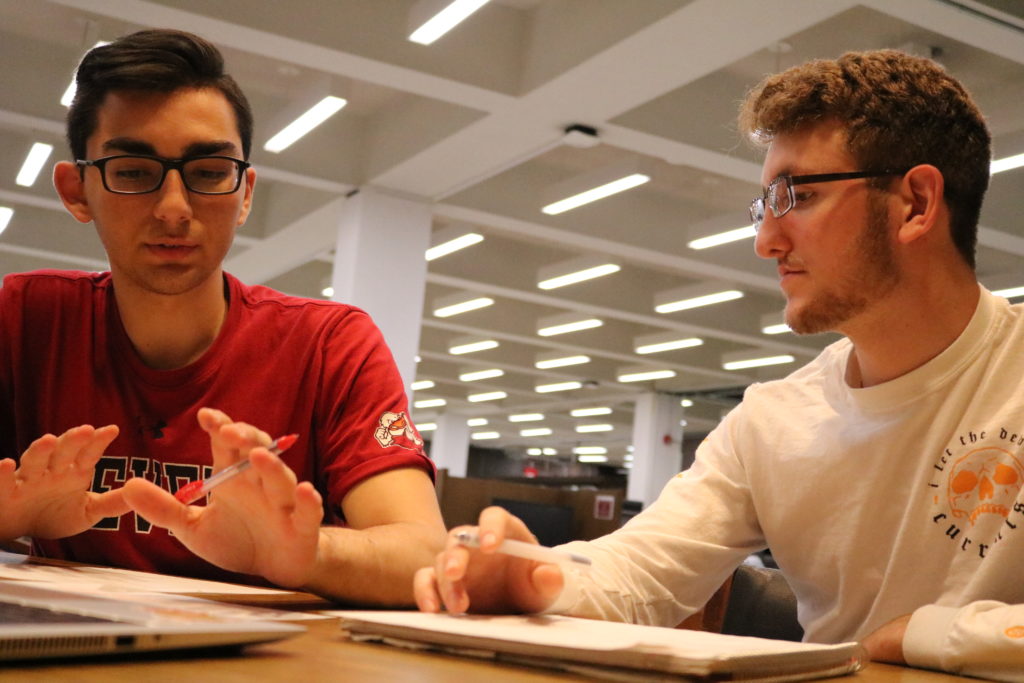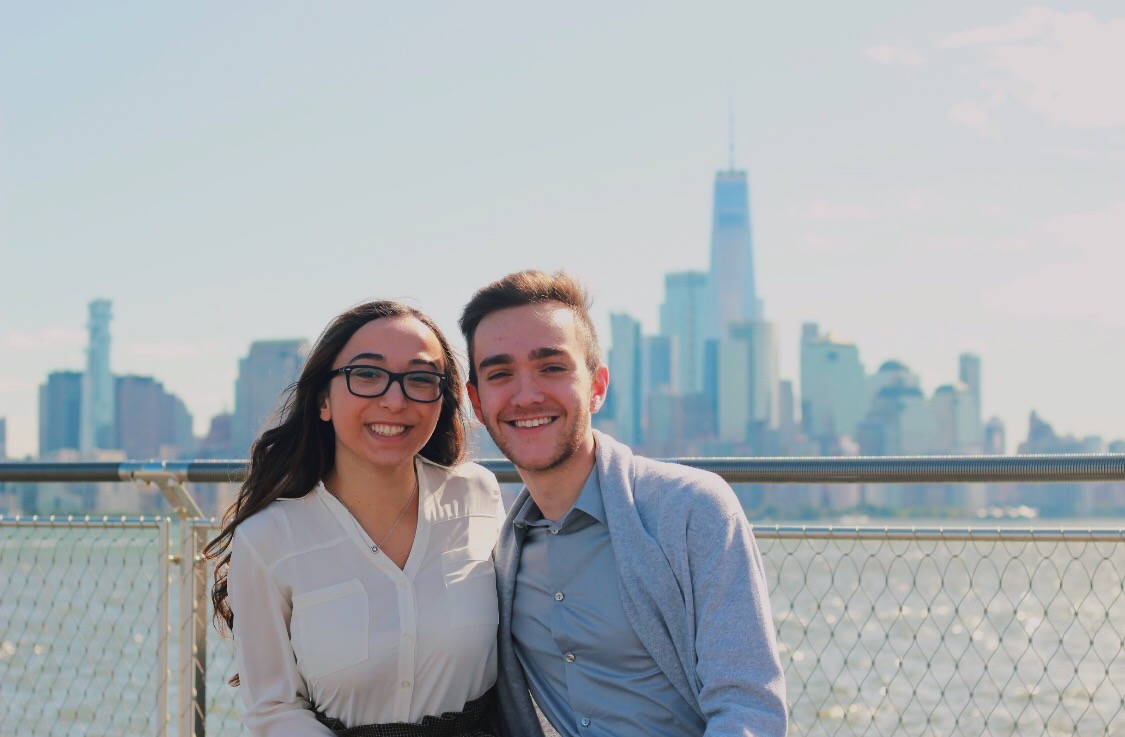Special Topics were questions that came up in the interview that were only asked to one of the candidates. The candidates’ direct responses are listed below.
E.J. Hannah and Jason Buckman:

E.J., you are an RA. Does that introduce potential bias as you are an employee of the school?
“Actually, I would admit that it is somewhat a conflict of interest. [Originally, E.J. stated that it does not introduce potential bias.] I guess because I’m working for the school it is, in my opinion, a minor conflict of interest. It hasn’t been a problem in the past working with administration in any department, especially in ResEd and RDS. It does also give me those avenues to work with them because I have better relations to start off with and I have a greater network both administratively and student-wise to hear their thoughts and opinions on what the Stevens community should look like, and that conflict of interest that I admit is unavoidable. At other schools, it’s significant to the extent where you can’t hold both positions. Fortunately, Stevens is more understanding. It’s also easier because Resident Assistants are unpaid […] Actually RAs do receive compensation, but we are not salaried.”
What if a situation arises where ResLife/ResED does something that negatively impacts the student experience? Would you still advocate for students or what would be your approach?
“I answered this same question when I was applying for the position. I will do everything in my power to advocate for what is best for the community. If administration makes an absurd decision that the students aren’t comfortable with, I will work with them as best I can to see that the appropriate compromise or resolution is reached. I’m not afraid, if that makes sense, to speak up for what rightfully needs to be said just because I’m an employee.”
So on faculty training, I know in the past we’ve had the modules promised and that administration reneged on the promise. How would you see modules or training be effectively implemented and then faculty actually doing them?
“First thing. Not everything we’re accomplishing are new ideas. There’s a lot of things that have been brought up in the past that just haven’t been sought out to completion. Lucas Gallo’s cabinet started this and the current cabinet didn’t pick up on it to finish, so we’re just carrying on the initiative. As for how we are going to do it differently, we’re at a little bit of an advantage; we are now after the fact of them having implemented them non-mandatory, so they have the data that they need to see that not enough administrators have filled out these training modules voluntarily and will need to require it.”
Do you see administrators being in support [of the modules] once they have the data?
“I believe so — they have explained several times in communications to The Stute or to Lucas Gallo that they are very open to reconsideration if they haven’t seen the desired results from implementing them non-mandatorily. Keeping the conversation going on things like student suicide because it’s very easy for the administration to sweep them under the rug and pretend that never happened. You have to be relentless when it comes to this sort of thing. You have to be on top of them to see that they “don’t forget;” you have to ensure that they’re gonna be there to get it done.”
You guys said you are the “best possible option.” Why is that?
“I think it’s through repeated demonstrations of accomplishing what the students want to see. We’ve spent the first 30 minutes of this interview talking about what we’ve done for the students — every single thing on there is for other students. We admittedly put more time into benefiting our community than we do our own academics at points. It’s like it’s something we’re extremely passionate about and I feel like we’ve demonstrated that passion time and time again, I would argue more than most other people in the Senate at this point. We speak through actions, not just our words.
Since the role of the SGA is to represent the students, how will you ensure that [you are representing the students] if you are also taking into account the administrators’ point of view as well?
“Their point of view is more what’s been attempted in the past — what do you see working and failing on campus. They are trained and their job often is to provide for students, so our job is to be that avenue of communication with them and make sure that they hear the viewpoint of students no matter how hard it might be for them to hear.”
Samanta Molla and Adrian Castellanos:
So you said there’s like a lack of communication right now between the Senate and the Cabinet. How would you go about fixing that?
“I just feel like we need to make sure that people are proud as Senators and passionate about what they’re doing. Something I would really like to do within the SGA: doing our Senate retreat twice a year, probably once a semester, and working on leadership workshops. I just feel like as PLs
[Peer Leaders] we were able to meet with a lot of different resources on campus, and I feel like that’s something we lack and don’t necessarily know who to go to. We know this person is from here but they aren’t necessarily the person we want to talk to.”
So how do you let students know that [they are also part of the SGA]?
“I think one of the first things we need to do is build the SGA as an organization internally, so that we all know our places and what we’d like to do. We all know that regardless of what our opinions are and where we stand on different issues we can expand beyond our organization. I feel like if we’re budgeting for all of these different organizations, we are kind of overseeing what they do, and we should be a role model. I feel that a lot of organizations outside of the SGA are doing a lot better in terms of their impact on campus and that’s something that I definitely want to work on with Adrian and the rest of the SGA.”
On trust for your platform, you said greater input on university projects, what specifically?
“For trust, for the most part, we are focused on trusting the administration to have student interests in mind and not make it [the school] a business operation. I think students should be invested in such large projects and they’re [administration] not hearing what students have to say. Obviously, construction is going to be a problem and I think that it will be beneficial for Stevens to grow as a university, but I think that knowing or being more transparent or the administration being more transparent with us, it definitely builds the relationship. I feel like as students we are paying to see these projects happen and I know that the administration understands that and a lot of their goals are long-term. But, like, we need to just make it clear to them that we want to be involved in this process and we should have a say in this process. And I feel like they’re more than willing to hear us out, but I feel like there has not been enough of us saying we want to be involved. Like, put us in the room with you.”
How will you make it clear to them?
“Just having conversations with them. The administrators are people and, like, you can just have a conversation with them about what the students overwhelmingly want and if they’re just like ‘no,’ well then you know that’s when it becomes time for the SGA to write a proclamation, and that’s when we start moving. But I think that a lot of the things that we want to accomplish can be done through just having conversations. I don’t think that they [administrators] are necessarily opposed to speaking to us, and I don’t think they’re necessarily opposed to working with us either. I think that me and Adrian will personally put that effort into making sure this is getting done.”

Be First to Comment